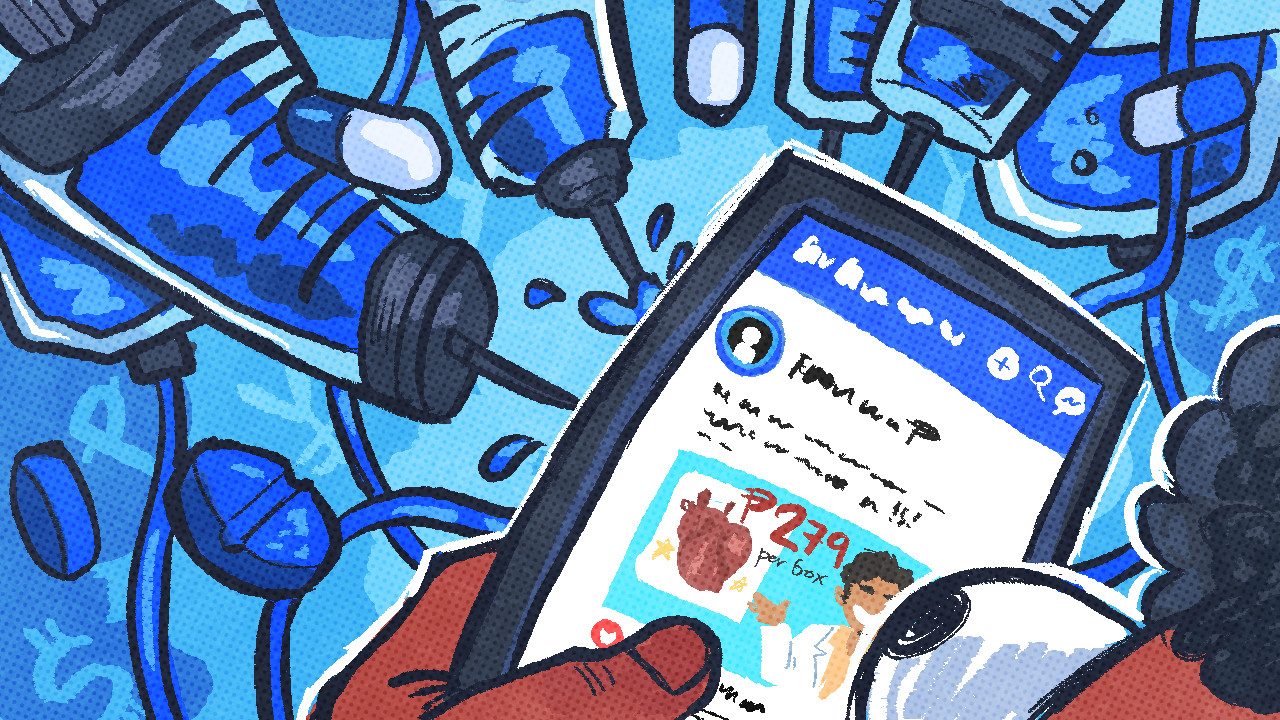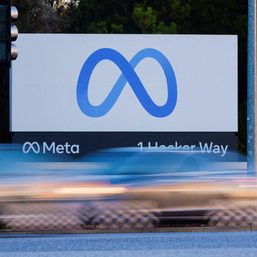SUMMARY
This is AI generated summarization, which may have errors. For context, always refer to the full article.

Facebook has become a favorite playground of advertisers out to make a quick buck from health products that promise quick but false cures.
Since February 2022, Rappler has found and fact-checked 86 dubious health product ads that use fraudulent marketing tactics on the social media platform to establish credibility and earn the trust of consumers.
The majority of these ads target Filipino consumers even though most of them, Rappler has found, are managed by people from other countries. Some pages have even pretended to be legitimately handled by Filipinos, and have employed ways to appeal to the Philippine audience.
Preying on consumers who believe their lies and false promises, these products get boosted exposure and engagement on Facebook because of their paid ads. Never mind if these products expose consumers to health risks.
This mirrors a two-faced approach on the part of Facebook: it has its own program of third-party independent fact checkers and profits from product ads that spread false claims on the platform.
Dubious products
Since early 2023, Dr. Anthony “Tony” Leachon – an internist-cardiologist at the Manila Doctors Hospital and former special adviser to the National Task Force Against COVID-19 – has been a victim of these fraudulent marketing tactics. His identity has been used to endorse Facebook ads of several health products.
One of the products that used Leachon in fake endorsements is diabetes product Glufarelin. Facebook pages that sell Glufarelin have also used the names of other personalities and agencies in selling their product without their permission: American nutrition researcher Dr. Neal Barnard, American celebrity doctor Mehmet Oz, Department of Health (DOH) Undersecretary Dr. Eric Tayag, and CNN Philippines’ health program host Dr. Freddie Gomez.
Even the Philippine General Hospital and University of the Philippines National Institutes of Health (UP-NIH) were used by Glufarelin without their consent.

On August 18, 2023, after Rappler’s fact-checking on Glufarelin, Leachon filed an identity theft case against the product and several others that used his identity for deceptive online promotions. (READ: After Rappler’s fact checking, Leachon files case vs. products using fake endorsements)
The trade and industry committee of the House of Representatives invited Leachon to a meeting on February 8 this year, where the House Resolutions (HR) on consumer safety were discussed. Among the resolutions discussed was House Resolution No. 221 that directs concerned House committees to conduct an inquiry on the “proliferation of international and locally-manufactured falsified medicines.”
“[The committee on trade and industry of the HOR conducted a hearing last month – they will craft [a] law on this matter,” Leachon told Rappler on April 15.
Besides efforts by the House of Representatives, the doctor also said that the Department of Trade and Industry-Cybercrime Investigation and Coordinating Center (DTI-CICC) will help with the investigation being conducted by the National Bureau of Investigation (NBI) on the matter.
Glufarelin is not the only health product to do this. Rappler has fact-checked several claims from products that promise immediate and quick miracle cures for diseases like diabetes, gout, arthritis, joint pains, sinusitis, hepatitis, and even cancer. Some products claim to effectively cause weight loss and skin problems in a short span of time.
Ads policy
According to the website of Facebook’s parent company Meta, advertisers that run ads across Meta’s platforms must follow their community and advertising standards. These standards aim to protect people from unsafe and discriminatory practices, frauds, and scams.
For people who use its platform, Meta spells out its advertising standards, listing the following as “illegal or otherwise considered unacceptable”:
- Illegal products and services
- Vaccine discouragement
- Discriminatory practices
- Inflammatory content
- Militarized social movements and violence-inducing conspiracy networks
Meta also includes disinformation as a type of content that is disallowed, along with content debunked by third-party fact-checkers like Rappler.
To enforce these policies, Meta said they use “automated and, in some instances, manual review,” a process where specific components of an ad, such as images, video, text and targeting information are checked, usually taking 24 hours to complete. Meta also said they “monitor and investigate advertiser behavior.”
An ad will be rejected if a violation is found at any point during the review process, and the business account or its assets may be restricted, Meta said.
Foreign-managed
The advertisement posts and pages of dubious health products fact-checked by Rappler may look and feel “Filipino,” but the reality is the majority of them are actually managed by foreign page administrators.
Rappler checked almost 250 advertisement posts from Facebook pages of dubious health products it had fact-checked before, and found that the managers of these pages have multiple page managers based in the following countries: Vietnam, Indonesia, Myanmar, Laos, India, Pakistan, Nigeria, United States, and Brazil. Their places of origin could be gleaned from the pages’ transparency tab.
Out of all these countries, most of the foreign managers of the pages of dubious health products are from Vietnam, where a total of 778 page managers are located. Only 34 page managers are in the Philippines.
Filipino-baiting ads
To appeal to Filipinos, several product ads posted by these foreign-managed pages used the following tactics:
Filipino names, posts. Rappler noticed that several Facebook pages of dubious health products, like “HA AN DUONG – Sabihin hindi sa insulin,” “GOUT – Huwag mag-alala tungkol sa Gout,” and “Lishou – Sentro ng pagbaba ng timbang 4” used Filipino in their Facebook pages. Posts of photos and videos, captions, and replies to comments were noticeably also in Filipino.
The US FDA and Australia’s Department of Health Therapeutic Goods Administration had flagged Lishou for containing a harmful substance that can cause major cardiac events.
Stolen videos, clips. Several product posts of claims that we had fact-checked before also used videos that showed clips of interviews and segments of health programs aired on television shows like TV5’s Healing Galing and ABS-CBN’s Salamat Dok. The interview clips they snatched were about the same illness or ailment that their products supposedly cure.
Fake endorsements. Some of the ads posted on the Facebook pages for dubious products like Glufarelin used the names of well-known health experts to establish credibility. The individuals and government institutions earlier named denied supporting Glufarelin.
Problematic products
At quick glance, Meta’s advertising policies seem strict, but Rappler’s fact-checking has shown that several health products managed to get past its review process.
Besides being unregistered with the Philippine FDA, several products that Rappler had fact-checked before were the subject of several regulatory agencies’ warnings about possible adverse effects on health.
For instance, warnings against the glaucoma product Dok Apo Healing Wonder Drops and the antibacterial cream Zudaifu had been issued by regulators.
The FDA told Rappler that these products “pose significant risks and hazards to consumers” because of unknown ingredients and contaminants that could be harmful to human health. This is on top of misleading claims that promise “unrealistic” health benefits.
“It is essential for consumers to be vigilant and only purchase food products from reputable sources that have undergone proper FDA registration and approval processes. This way, they can protect their well-being and make informed decisions about the products they use,” the FDA said.
Robust policies needed
Acknowledging that social media platforms like Facebook have become a popular avenue for the sale of unregistered food products because of wide reach and easy accessibility, the FDA told Rappler that crafting policies to prevent this form of platform misuse is vital. However, implementation could be tricky.
According to the FDA, they had already taken the following measures to prevent the sale of unregistered food products on Facebook: encouraging product registration, promoting consumer awareness, and collaborating with Facebook to enforce stringent policies.
The FDA also suggested that Facebook “require sellers to provide proof of registration” such as a Certificate of Product Registration (CPR) from the agency itself to reduce the likelihood of consumers purchasing unregulated items.
Implementation of these policies and strategies on Facebook, according to the regulatory agency, will face several key challenges: the fast-paced nature of social media and sheer volume of content, the limited workforce of the FDA, and the global nature of social media platforms.
“As of now, there [is] no available data specifically regarding the sale of unregistered health products on Facebook or other social media platforms and the extent and severity of the problem,” the FDA said.
The FDA added that its collaboration with social media platforms like Facebook produces “a safer marketplace for food products and safeguards public health.”
No prevention plan
In a tight spot between advertisers who pay money and fighting disinformation spread by some of these advertisers, Meta said investigations are still ongoing.
“Our Community Standards, Advertising Standards and Commerce policies outline what people can share and advertise on Facebook. We have removed a number of these Pages, profiles and posts, for violating our policies. We are continuing to investigate this case and we will take action should there be further violating content,” a Meta spokesperson told Rappler.
The social media platform is also working with the FDA and other agencies that flag products that may violate their policies and local laws. According to the FDA, an example of this collaboration is the “Facebook Consumer Policy Channel,” a platform for FDA stakeholders to report content that may have violated local policies.
However, the platform has not provided plans to prevent unregistered products from entering Facebook. Issuing penalties only after the products are flagged for containing false or altered information is a little too late when it comes to stopping the spread of disinformation on the platform.
There are no guarantees that people who have seen the false information will eventually see the fact-checked information.
Third-party fact checkers may continue refuting false claims made by several health products on Meta’s platforms, but for as long as Meta’s ad review process allows these health products to run ads, false claims will continue to reach Facebook users way faster before fact checkers can spot and debunk them.
Left unchecked, these health products and the false claims they make will continue posing health risks to the public who believe the miracle cures promised them. – Rappler.com
Add a comment
How does this make you feel?





![[DECODED] The Philippines and Brazil have a lot in common. Online toxicity is one.](https://www.rappler.com/tachyon/2024/07/misogyny-tech-carousel-revised-decoded-july-2024.jpg?resize=257%2C257&crop_strategy=attention)













There are no comments yet. Add your comment to start the conversation.